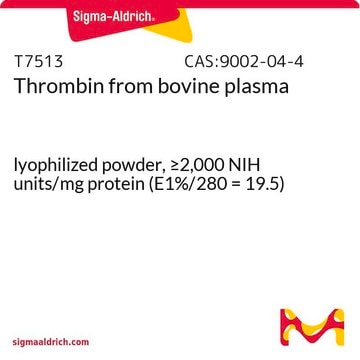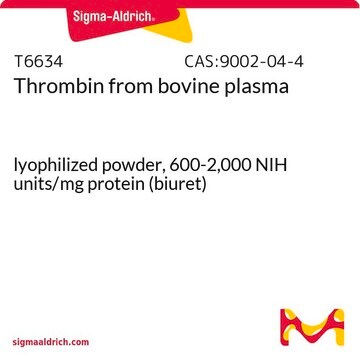RECOMT
Thrombin CleanCleave™ Kit
Synonym(s):
Thrombin Cleavage Kit
About This Item
Recommended Products
form
suspension
mol wt
37 kDa
technique(s)
protein purification: suitable
shipped in
wet ice
storage temp.
2-8°C
General description
Application
Features and Benefits
- Fast, efficient cleavage in as little as 2 hours
- Thrombin is covalently bound to agarose for easy removal.
- The robust cleavage reaction is effective at temperatures from 4 °C to 37 °C and over a wide range of pH and ionic strengths.
- Cleave tags even in the presence of 0.1% Triton™, 1 M urea or 5 mM EDTA
- Thrombin-agarose is reusable.
Quantity
Legal Information
Kit Components Only
- Thrombin Cleavage Buffer, 10× 10 mL
related product
Storage Class Code
10 - Combustible liquids
Flash Point(F)
Not applicable
Flash Point(C)
Not applicable
Regulatory Listings
Regulatory Listings are mainly provided for chemical products. Only limited information can be provided here for non-chemical products. No entry means none of the components are listed. It is the user’s obligation to ensure the safe and legal use of the product.
PDSCL
Please refer to KIT Component information
PRTR
Please refer to KIT Component information
FSL
Please refer to KIT Component information
ISHL Indicated Name
Please refer to KIT Component information
ISHL Notified Names
Please refer to KIT Component information
Cartagena Act
Please refer to KIT Component information
JAN Code
キットコンポーネントの情報を参照してください
Certificates of Analysis (COA)
Search for Certificates of Analysis (COA) by entering the products Lot/Batch Number. Lot and Batch Numbers can be found on a product’s label following the words ‘Lot’ or ‘Batch’.
Already Own This Product?
Find documentation for the products that you have recently purchased in the Document Library.
Customers Also Viewed
Articles
This page shows how to cleave and purify GST-tagged proteins bound to GSTrap from Cytiva.
Protocols
This page how to remove GST tags by enzymatic cleavage using Cytiva products.
Our team of scientists has experience in all areas of research including Life Science, Material Science, Chemical Synthesis, Chromatography, Analytical and many others.
Contact Technical Service









